Servant Leadership: Conceptualization and Analysis
VerifiedAdded on 2023/04/22
|8
|2161
|127
AI Summary
This paper discusses the concept of servant leadership and analyzes the author's personal leadership style. It covers core values, principles, and beliefs that impact leadership philosophy. The paper also includes key leadership experiences and the importance of emotional healing in servant leadership.
Contribute Materials
Your contribution can guide someone’s learning journey. Share your
documents today.
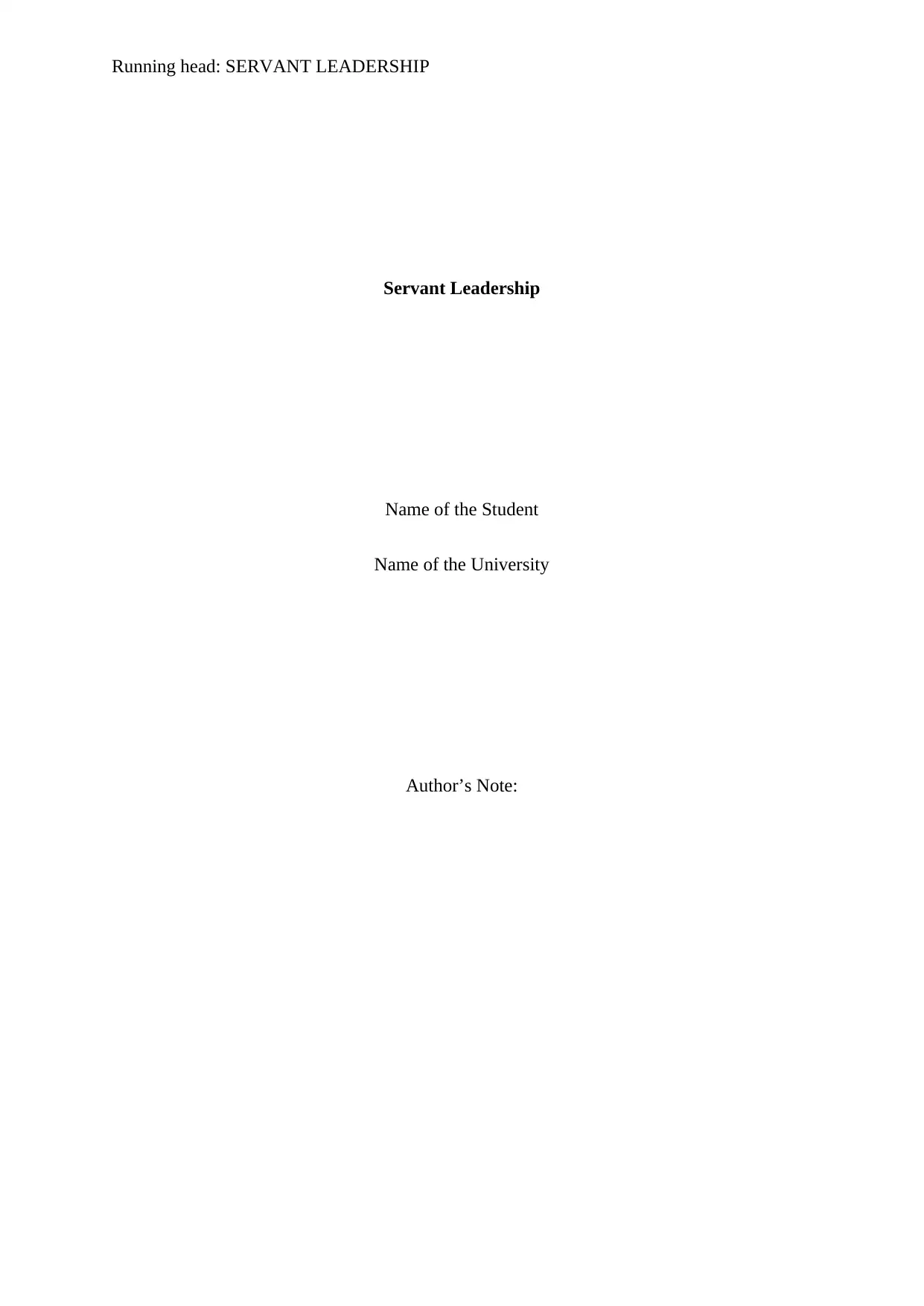
Running head: SERVANT LEADERSHIP
Servant Leadership
Name of the Student
Name of the University
Author’s Note:
Servant Leadership
Name of the Student
Name of the University
Author’s Note:
Secure Best Marks with AI Grader
Need help grading? Try our AI Grader for instant feedback on your assignments.
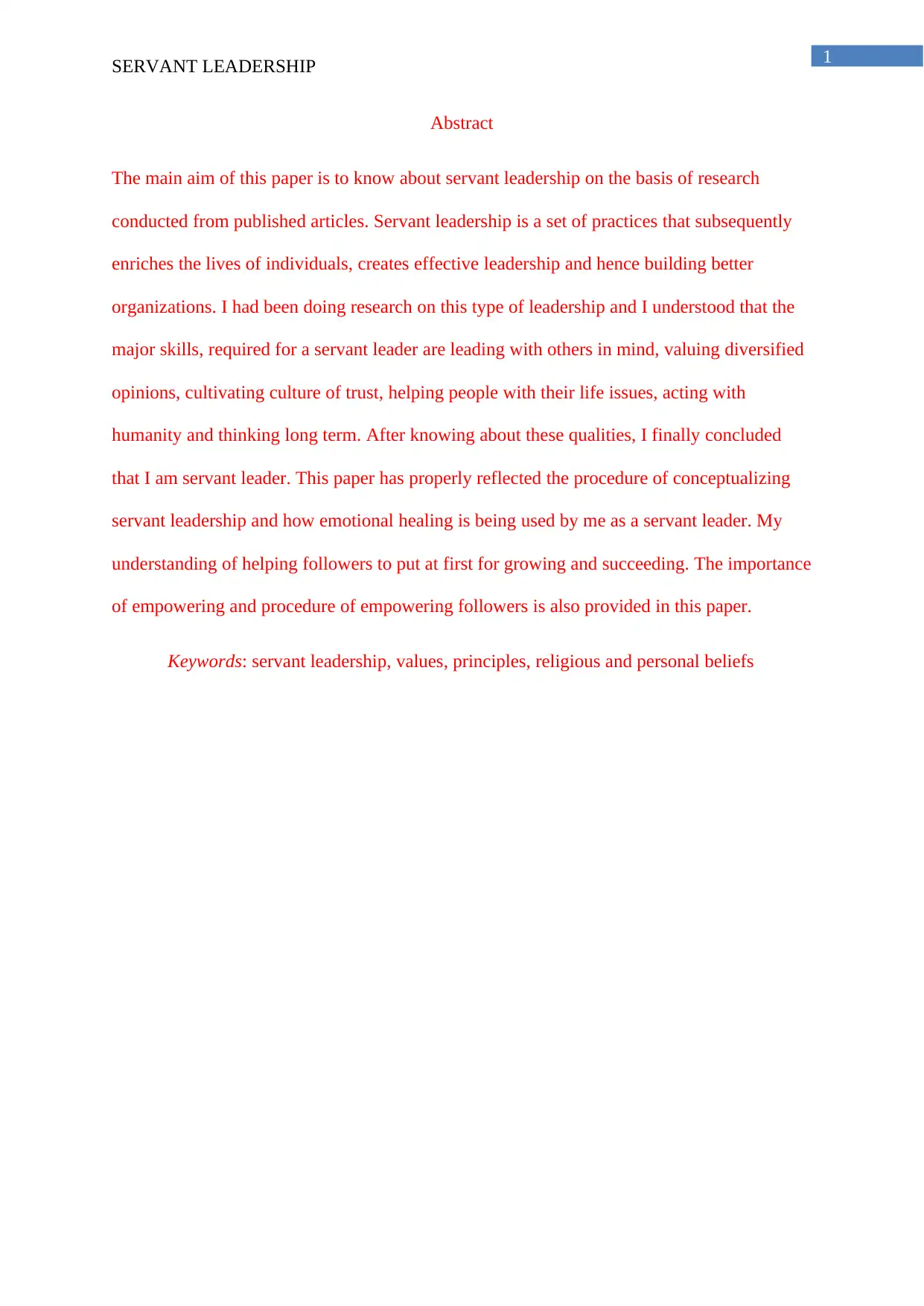
1
SERVANT LEADERSHIP
Abstract
The main aim of this paper is to know about servant leadership on the basis of research
conducted from published articles. Servant leadership is a set of practices that subsequently
enriches the lives of individuals, creates effective leadership and hence building better
organizations. I had been doing research on this type of leadership and I understood that the
major skills, required for a servant leader are leading with others in mind, valuing diversified
opinions, cultivating culture of trust, helping people with their life issues, acting with
humanity and thinking long term. After knowing about these qualities, I finally concluded
that I am servant leader. This paper has properly reflected the procedure of conceptualizing
servant leadership and how emotional healing is being used by me as a servant leader. My
understanding of helping followers to put at first for growing and succeeding. The importance
of empowering and procedure of empowering followers is also provided in this paper.
Keywords: servant leadership, values, principles, religious and personal beliefs
SERVANT LEADERSHIP
Abstract
The main aim of this paper is to know about servant leadership on the basis of research
conducted from published articles. Servant leadership is a set of practices that subsequently
enriches the lives of individuals, creates effective leadership and hence building better
organizations. I had been doing research on this type of leadership and I understood that the
major skills, required for a servant leader are leading with others in mind, valuing diversified
opinions, cultivating culture of trust, helping people with their life issues, acting with
humanity and thinking long term. After knowing about these qualities, I finally concluded
that I am servant leader. This paper has properly reflected the procedure of conceptualizing
servant leadership and how emotional healing is being used by me as a servant leader. My
understanding of helping followers to put at first for growing and succeeding. The importance
of empowering and procedure of empowering followers is also provided in this paper.
Keywords: servant leadership, values, principles, religious and personal beliefs
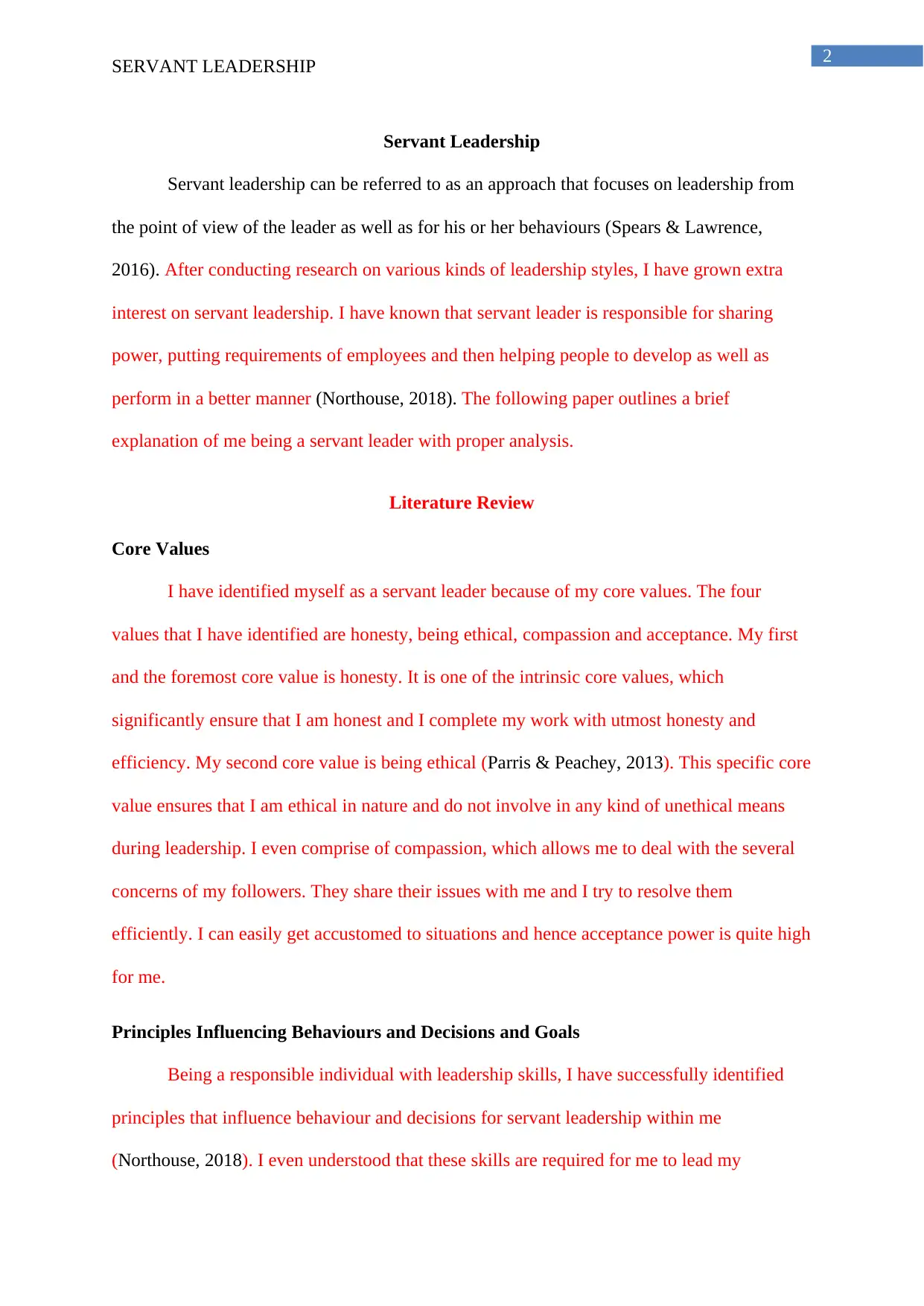
2
SERVANT LEADERSHIP
Servant Leadership
Servant leadership can be referred to as an approach that focuses on leadership from
the point of view of the leader as well as for his or her behaviours (Spears & Lawrence,
2016). After conducting research on various kinds of leadership styles, I have grown extra
interest on servant leadership. I have known that servant leader is responsible for sharing
power, putting requirements of employees and then helping people to develop as well as
perform in a better manner (Northouse, 2018). The following paper outlines a brief
explanation of me being a servant leader with proper analysis.
Literature Review
Core Values
I have identified myself as a servant leader because of my core values. The four
values that I have identified are honesty, being ethical, compassion and acceptance. My first
and the foremost core value is honesty. It is one of the intrinsic core values, which
significantly ensure that I am honest and I complete my work with utmost honesty and
efficiency. My second core value is being ethical (Parris & Peachey, 2013). This specific core
value ensures that I am ethical in nature and do not involve in any kind of unethical means
during leadership. I even comprise of compassion, which allows me to deal with the several
concerns of my followers. They share their issues with me and I try to resolve them
efficiently. I can easily get accustomed to situations and hence acceptance power is quite high
for me.
Principles Influencing Behaviours and Decisions and Goals
Being a responsible individual with leadership skills, I have successfully identified
principles that influence behaviour and decisions for servant leadership within me
(Northouse, 2018). I even understood that these skills are required for me to lead my
SERVANT LEADERSHIP
Servant Leadership
Servant leadership can be referred to as an approach that focuses on leadership from
the point of view of the leader as well as for his or her behaviours (Spears & Lawrence,
2016). After conducting research on various kinds of leadership styles, I have grown extra
interest on servant leadership. I have known that servant leader is responsible for sharing
power, putting requirements of employees and then helping people to develop as well as
perform in a better manner (Northouse, 2018). The following paper outlines a brief
explanation of me being a servant leader with proper analysis.
Literature Review
Core Values
I have identified myself as a servant leader because of my core values. The four
values that I have identified are honesty, being ethical, compassion and acceptance. My first
and the foremost core value is honesty. It is one of the intrinsic core values, which
significantly ensure that I am honest and I complete my work with utmost honesty and
efficiency. My second core value is being ethical (Parris & Peachey, 2013). This specific core
value ensures that I am ethical in nature and do not involve in any kind of unethical means
during leadership. I even comprise of compassion, which allows me to deal with the several
concerns of my followers. They share their issues with me and I try to resolve them
efficiently. I can easily get accustomed to situations and hence acceptance power is quite high
for me.
Principles Influencing Behaviours and Decisions and Goals
Being a responsible individual with leadership skills, I have successfully identified
principles that influence behaviour and decisions for servant leadership within me
(Northouse, 2018). I even understood that these skills are required for me to lead my
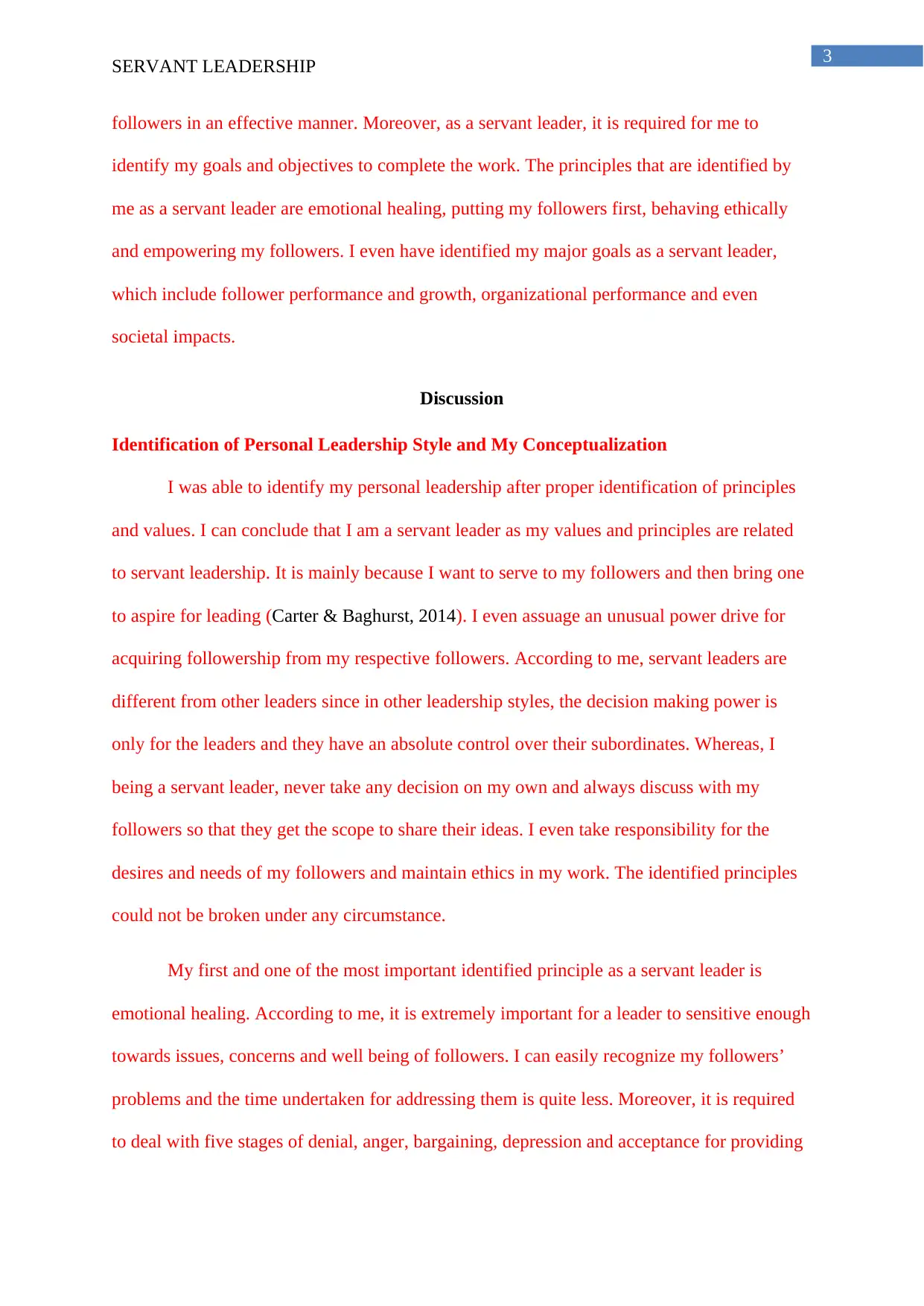
3
SERVANT LEADERSHIP
followers in an effective manner. Moreover, as a servant leader, it is required for me to
identify my goals and objectives to complete the work. The principles that are identified by
me as a servant leader are emotional healing, putting my followers first, behaving ethically
and empowering my followers. I even have identified my major goals as a servant leader,
which include follower performance and growth, organizational performance and even
societal impacts.
Discussion
Identification of Personal Leadership Style and My Conceptualization
I was able to identify my personal leadership after proper identification of principles
and values. I can conclude that I am a servant leader as my values and principles are related
to servant leadership. It is mainly because I want to serve to my followers and then bring one
to aspire for leading (Carter & Baghurst, 2014). I even assuage an unusual power drive for
acquiring followership from my respective followers. According to me, servant leaders are
different from other leaders since in other leadership styles, the decision making power is
only for the leaders and they have an absolute control over their subordinates. Whereas, I
being a servant leader, never take any decision on my own and always discuss with my
followers so that they get the scope to share their ideas. I even take responsibility for the
desires and needs of my followers and maintain ethics in my work. The identified principles
could not be broken under any circumstance.
My first and one of the most important identified principle as a servant leader is
emotional healing. According to me, it is extremely important for a leader to sensitive enough
towards issues, concerns and well being of followers. I can easily recognize my followers’
problems and the time undertaken for addressing them is quite less. Moreover, it is required
to deal with five stages of denial, anger, bargaining, depression and acceptance for providing
SERVANT LEADERSHIP
followers in an effective manner. Moreover, as a servant leader, it is required for me to
identify my goals and objectives to complete the work. The principles that are identified by
me as a servant leader are emotional healing, putting my followers first, behaving ethically
and empowering my followers. I even have identified my major goals as a servant leader,
which include follower performance and growth, organizational performance and even
societal impacts.
Discussion
Identification of Personal Leadership Style and My Conceptualization
I was able to identify my personal leadership after proper identification of principles
and values. I can conclude that I am a servant leader as my values and principles are related
to servant leadership. It is mainly because I want to serve to my followers and then bring one
to aspire for leading (Carter & Baghurst, 2014). I even assuage an unusual power drive for
acquiring followership from my respective followers. According to me, servant leaders are
different from other leaders since in other leadership styles, the decision making power is
only for the leaders and they have an absolute control over their subordinates. Whereas, I
being a servant leader, never take any decision on my own and always discuss with my
followers so that they get the scope to share their ideas. I even take responsibility for the
desires and needs of my followers and maintain ethics in my work. The identified principles
could not be broken under any circumstance.
My first and one of the most important identified principle as a servant leader is
emotional healing. According to me, it is extremely important for a leader to sensitive enough
towards issues, concerns and well being of followers. I can easily recognize my followers’
problems and the time undertaken for addressing them is quite less. Moreover, it is required
to deal with five stages of denial, anger, bargaining, depression and acceptance for providing
Secure Best Marks with AI Grader
Need help grading? Try our AI Grader for instant feedback on your assignments.
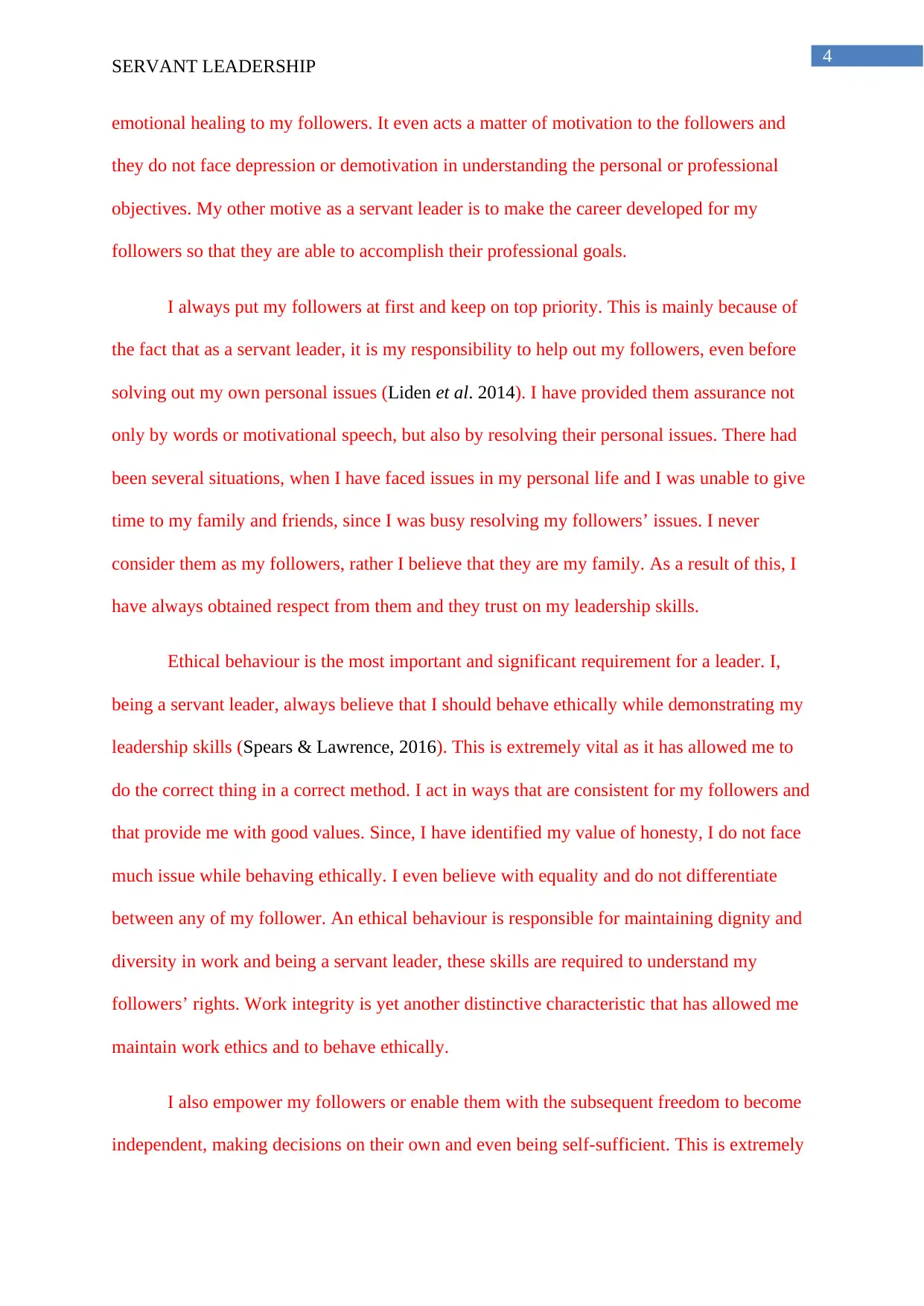
4
SERVANT LEADERSHIP
emotional healing to my followers. It even acts a matter of motivation to the followers and
they do not face depression or demotivation in understanding the personal or professional
objectives. My other motive as a servant leader is to make the career developed for my
followers so that they are able to accomplish their professional goals.
I always put my followers at first and keep on top priority. This is mainly because of
the fact that as a servant leader, it is my responsibility to help out my followers, even before
solving out my own personal issues (Liden et al. 2014). I have provided them assurance not
only by words or motivational speech, but also by resolving their personal issues. There had
been several situations, when I have faced issues in my personal life and I was unable to give
time to my family and friends, since I was busy resolving my followers’ issues. I never
consider them as my followers, rather I believe that they are my family. As a result of this, I
have always obtained respect from them and they trust on my leadership skills.
Ethical behaviour is the most important and significant requirement for a leader. I,
being a servant leader, always believe that I should behave ethically while demonstrating my
leadership skills (Spears & Lawrence, 2016). This is extremely vital as it has allowed me to
do the correct thing in a correct method. I act in ways that are consistent for my followers and
that provide me with good values. Since, I have identified my value of honesty, I do not face
much issue while behaving ethically. I even believe with equality and do not differentiate
between any of my follower. An ethical behaviour is responsible for maintaining dignity and
diversity in work and being a servant leader, these skills are required to understand my
followers’ rights. Work integrity is yet another distinctive characteristic that has allowed me
maintain work ethics and to behave ethically.
I also empower my followers or enable them with the subsequent freedom to become
independent, making decisions on their own and even being self-sufficient. This is extremely
SERVANT LEADERSHIP
emotional healing to my followers. It even acts a matter of motivation to the followers and
they do not face depression or demotivation in understanding the personal or professional
objectives. My other motive as a servant leader is to make the career developed for my
followers so that they are able to accomplish their professional goals.
I always put my followers at first and keep on top priority. This is mainly because of
the fact that as a servant leader, it is my responsibility to help out my followers, even before
solving out my own personal issues (Liden et al. 2014). I have provided them assurance not
only by words or motivational speech, but also by resolving their personal issues. There had
been several situations, when I have faced issues in my personal life and I was unable to give
time to my family and friends, since I was busy resolving my followers’ issues. I never
consider them as my followers, rather I believe that they are my family. As a result of this, I
have always obtained respect from them and they trust on my leadership skills.
Ethical behaviour is the most important and significant requirement for a leader. I,
being a servant leader, always believe that I should behave ethically while demonstrating my
leadership skills (Spears & Lawrence, 2016). This is extremely vital as it has allowed me to
do the correct thing in a correct method. I act in ways that are consistent for my followers and
that provide me with good values. Since, I have identified my value of honesty, I do not face
much issue while behaving ethically. I even believe with equality and do not differentiate
between any of my follower. An ethical behaviour is responsible for maintaining dignity and
diversity in work and being a servant leader, these skills are required to understand my
followers’ rights. Work integrity is yet another distinctive characteristic that has allowed me
maintain work ethics and to behave ethically.
I also empower my followers or enable them with the subsequent freedom to become
independent, making decisions on their own and even being self-sufficient. This is extremely
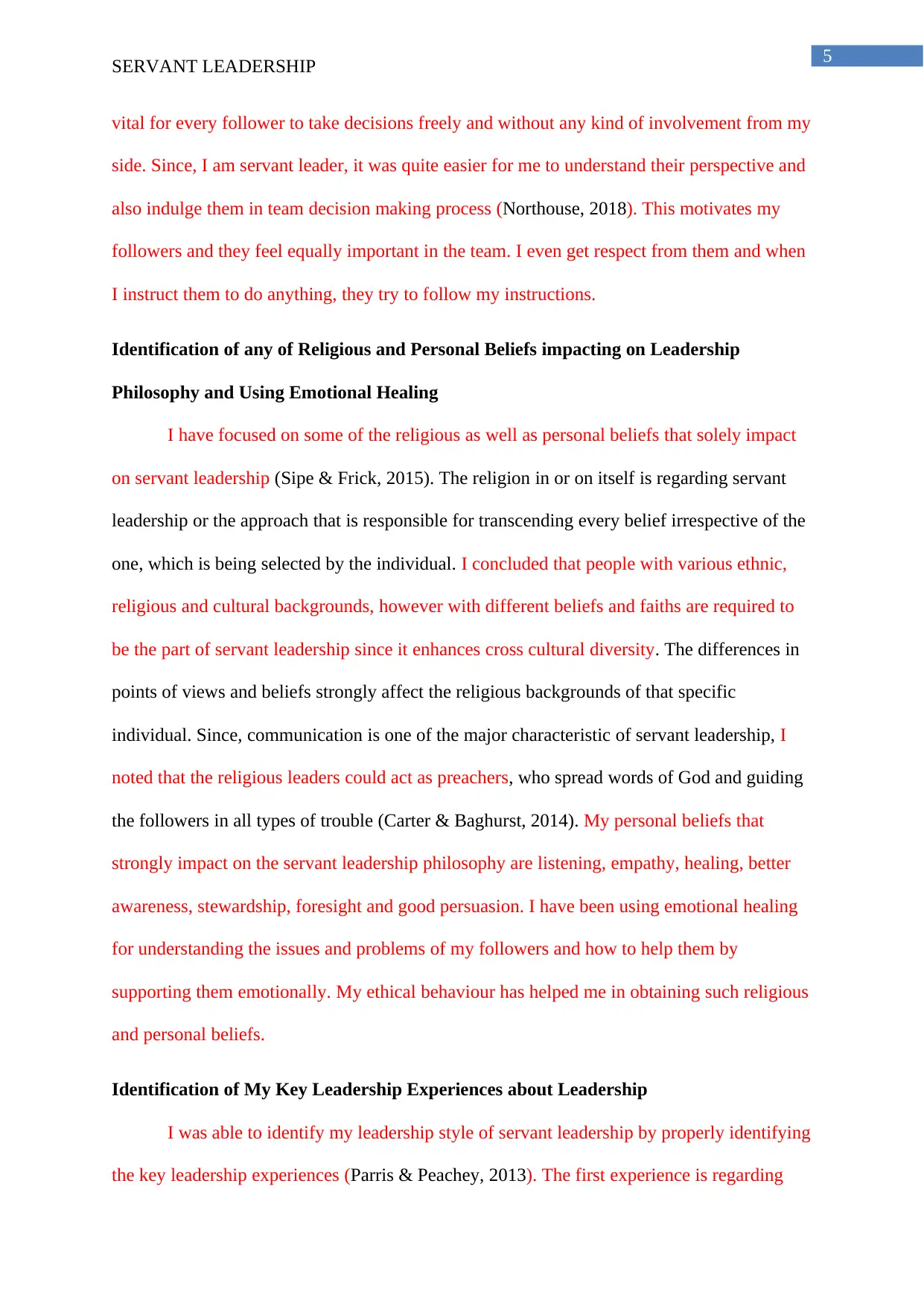
5
SERVANT LEADERSHIP
vital for every follower to take decisions freely and without any kind of involvement from my
side. Since, I am servant leader, it was quite easier for me to understand their perspective and
also indulge them in team decision making process (Northouse, 2018). This motivates my
followers and they feel equally important in the team. I even get respect from them and when
I instruct them to do anything, they try to follow my instructions.
Identification of any of Religious and Personal Beliefs impacting on Leadership
Philosophy and Using Emotional Healing
I have focused on some of the religious as well as personal beliefs that solely impact
on servant leadership (Sipe & Frick, 2015). The religion in or on itself is regarding servant
leadership or the approach that is responsible for transcending every belief irrespective of the
one, which is being selected by the individual. I concluded that people with various ethnic,
religious and cultural backgrounds, however with different beliefs and faiths are required to
be the part of servant leadership since it enhances cross cultural diversity. The differences in
points of views and beliefs strongly affect the religious backgrounds of that specific
individual. Since, communication is one of the major characteristic of servant leadership, I
noted that the religious leaders could act as preachers, who spread words of God and guiding
the followers in all types of trouble (Carter & Baghurst, 2014). My personal beliefs that
strongly impact on the servant leadership philosophy are listening, empathy, healing, better
awareness, stewardship, foresight and good persuasion. I have been using emotional healing
for understanding the issues and problems of my followers and how to help them by
supporting them emotionally. My ethical behaviour has helped me in obtaining such religious
and personal beliefs.
Identification of My Key Leadership Experiences about Leadership
I was able to identify my leadership style of servant leadership by properly identifying
the key leadership experiences (Parris & Peachey, 2013). The first experience is regarding
SERVANT LEADERSHIP
vital for every follower to take decisions freely and without any kind of involvement from my
side. Since, I am servant leader, it was quite easier for me to understand their perspective and
also indulge them in team decision making process (Northouse, 2018). This motivates my
followers and they feel equally important in the team. I even get respect from them and when
I instruct them to do anything, they try to follow my instructions.
Identification of any of Religious and Personal Beliefs impacting on Leadership
Philosophy and Using Emotional Healing
I have focused on some of the religious as well as personal beliefs that solely impact
on servant leadership (Sipe & Frick, 2015). The religion in or on itself is regarding servant
leadership or the approach that is responsible for transcending every belief irrespective of the
one, which is being selected by the individual. I concluded that people with various ethnic,
religious and cultural backgrounds, however with different beliefs and faiths are required to
be the part of servant leadership since it enhances cross cultural diversity. The differences in
points of views and beliefs strongly affect the religious backgrounds of that specific
individual. Since, communication is one of the major characteristic of servant leadership, I
noted that the religious leaders could act as preachers, who spread words of God and guiding
the followers in all types of trouble (Carter & Baghurst, 2014). My personal beliefs that
strongly impact on the servant leadership philosophy are listening, empathy, healing, better
awareness, stewardship, foresight and good persuasion. I have been using emotional healing
for understanding the issues and problems of my followers and how to help them by
supporting them emotionally. My ethical behaviour has helped me in obtaining such religious
and personal beliefs.
Identification of My Key Leadership Experiences about Leadership
I was able to identify my leadership style of servant leadership by properly identifying
the key leadership experiences (Parris & Peachey, 2013). The first experience is regarding
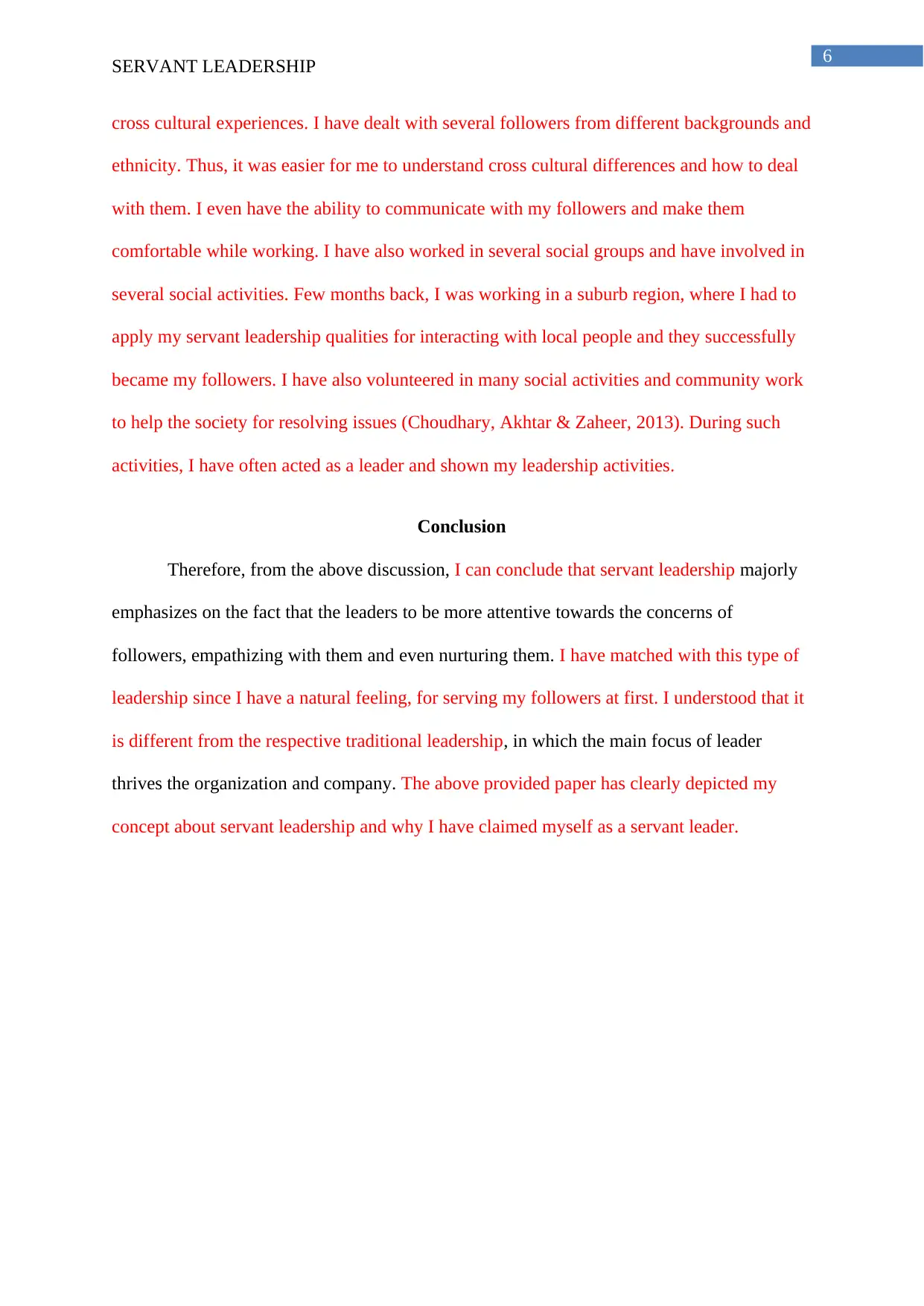
6
SERVANT LEADERSHIP
cross cultural experiences. I have dealt with several followers from different backgrounds and
ethnicity. Thus, it was easier for me to understand cross cultural differences and how to deal
with them. I even have the ability to communicate with my followers and make them
comfortable while working. I have also worked in several social groups and have involved in
several social activities. Few months back, I was working in a suburb region, where I had to
apply my servant leadership qualities for interacting with local people and they successfully
became my followers. I have also volunteered in many social activities and community work
to help the society for resolving issues (Choudhary, Akhtar & Zaheer, 2013). During such
activities, I have often acted as a leader and shown my leadership activities.
Conclusion
Therefore, from the above discussion, I can conclude that servant leadership majorly
emphasizes on the fact that the leaders to be more attentive towards the concerns of
followers, empathizing with them and even nurturing them. I have matched with this type of
leadership since I have a natural feeling, for serving my followers at first. I understood that it
is different from the respective traditional leadership, in which the main focus of leader
thrives the organization and company. The above provided paper has clearly depicted my
concept about servant leadership and why I have claimed myself as a servant leader.
SERVANT LEADERSHIP
cross cultural experiences. I have dealt with several followers from different backgrounds and
ethnicity. Thus, it was easier for me to understand cross cultural differences and how to deal
with them. I even have the ability to communicate with my followers and make them
comfortable while working. I have also worked in several social groups and have involved in
several social activities. Few months back, I was working in a suburb region, where I had to
apply my servant leadership qualities for interacting with local people and they successfully
became my followers. I have also volunteered in many social activities and community work
to help the society for resolving issues (Choudhary, Akhtar & Zaheer, 2013). During such
activities, I have often acted as a leader and shown my leadership activities.
Conclusion
Therefore, from the above discussion, I can conclude that servant leadership majorly
emphasizes on the fact that the leaders to be more attentive towards the concerns of
followers, empathizing with them and even nurturing them. I have matched with this type of
leadership since I have a natural feeling, for serving my followers at first. I understood that it
is different from the respective traditional leadership, in which the main focus of leader
thrives the organization and company. The above provided paper has clearly depicted my
concept about servant leadership and why I have claimed myself as a servant leader.
Paraphrase This Document
Need a fresh take? Get an instant paraphrase of this document with our AI Paraphraser
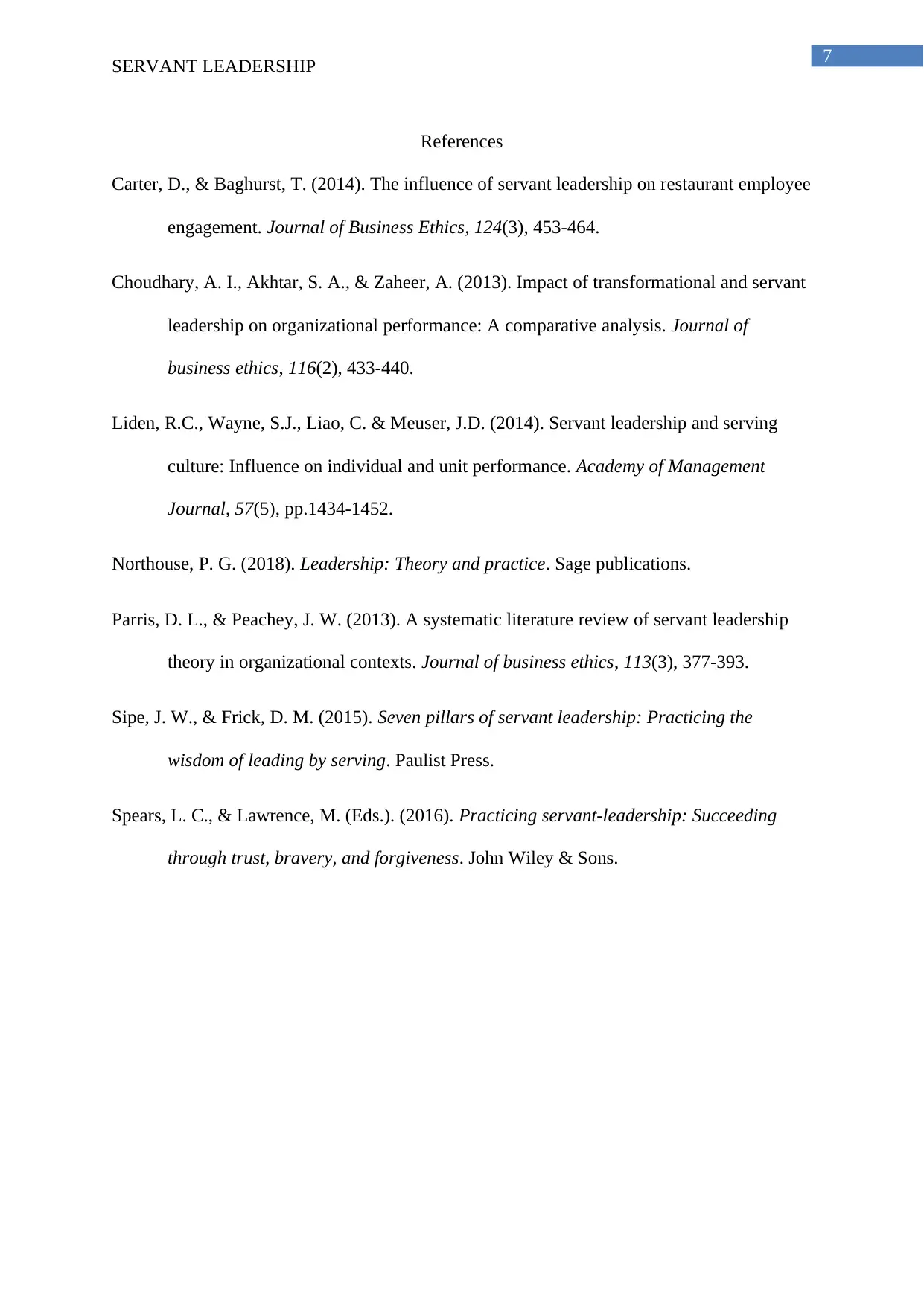
7
SERVANT LEADERSHIP
References
Carter, D., & Baghurst, T. (2014). The influence of servant leadership on restaurant employee
engagement. Journal of Business Ethics, 124(3), 453-464.
Choudhary, A. I., Akhtar, S. A., & Zaheer, A. (2013). Impact of transformational and servant
leadership on organizational performance: A comparative analysis. Journal of
business ethics, 116(2), 433-440.
Liden, R.C., Wayne, S.J., Liao, C. & Meuser, J.D. (2014). Servant leadership and serving
culture: Influence on individual and unit performance. Academy of Management
Journal, 57(5), pp.1434-1452.
Northouse, P. G. (2018). Leadership: Theory and practice. Sage publications.
Parris, D. L., & Peachey, J. W. (2013). A systematic literature review of servant leadership
theory in organizational contexts. Journal of business ethics, 113(3), 377-393.
Sipe, J. W., & Frick, D. M. (2015). Seven pillars of servant leadership: Practicing the
wisdom of leading by serving. Paulist Press.
Spears, L. C., & Lawrence, M. (Eds.). (2016). Practicing servant-leadership: Succeeding
through trust, bravery, and forgiveness. John Wiley & Sons.
SERVANT LEADERSHIP
References
Carter, D., & Baghurst, T. (2014). The influence of servant leadership on restaurant employee
engagement. Journal of Business Ethics, 124(3), 453-464.
Choudhary, A. I., Akhtar, S. A., & Zaheer, A. (2013). Impact of transformational and servant
leadership on organizational performance: A comparative analysis. Journal of
business ethics, 116(2), 433-440.
Liden, R.C., Wayne, S.J., Liao, C. & Meuser, J.D. (2014). Servant leadership and serving
culture: Influence on individual and unit performance. Academy of Management
Journal, 57(5), pp.1434-1452.
Northouse, P. G. (2018). Leadership: Theory and practice. Sage publications.
Parris, D. L., & Peachey, J. W. (2013). A systematic literature review of servant leadership
theory in organizational contexts. Journal of business ethics, 113(3), 377-393.
Sipe, J. W., & Frick, D. M. (2015). Seven pillars of servant leadership: Practicing the
wisdom of leading by serving. Paulist Press.
Spears, L. C., & Lawrence, M. (Eds.). (2016). Practicing servant-leadership: Succeeding
through trust, bravery, and forgiveness. John Wiley & Sons.
1 out of 8
Related Documents
Your All-in-One AI-Powered Toolkit for Academic Success.
+13062052269
info@desklib.com
Available 24*7 on WhatsApp / Email
![[object Object]](/_next/static/media/star-bottom.7253800d.svg)
Unlock your academic potential
© 2024 | Zucol Services PVT LTD | All rights reserved.




